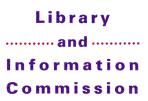 Prospects: a strategy for action
Prospects: a strategy for action
Library and Information Research, Development
and Innovation in the United Kingdom - Proposals for consultation
Library and Information Commission Research Committee, November 1997
2020 Vision
The UK will play a leading role in the dominant global information economy through:
- connectivity - providing univeral access to the products of the human mind
- content - creating a digital library of the UK's intellectual heritage of culture and innovation
- competences - equipping individuals and organisation to play their full role in a learning and information society
External Environmental relating to LIS
The Commission recognises that library and information services are operating in a rapidly changing and increasingly sophistcated external environment where:
- Technology gives the potential for universal access to information and all information becomes potentially available
- Acces to knowledge/information underpins a democratic society
- Information is an international commodity
- Knowledge underpins all sucessful economic activity
- Industry is increasingly dependent on an informed workforce
- Information must be accessible
- Information must be organised and managed
- Information skills are fundamental coping skills
- Information needs are increasingly complex and may be met from multiple sources
- This discontinuities between technology and our abilities to deal with it need to be understood and managed
- The library and information sector is a substantial part of the UK economy
Proposition: Values
The Commission believes in the added value of library and information services which:
- form a substantial sector of the economy; the UK's leadership role in the international LIS sector can be translated into a leading role in the global information economy
- are necessary to the well-being of individuals, communities and society
- are the memory of society through collecting and preserving knowledge
- work with knowledge; add value by evaluating, making accessible, mediating, packaging and prompting knowledge
- provide access to: opportunities for literacy and lifelong learning; the knowledge which underpins all successful economic activity; the information which is central to a democratic society; the information, knowledge and works of creative imagination which embody healthy social and cultural diversity and understanding; a socially inclusive cultural and creative environment
- reach into people's lives in many ways; people use a range of LIS throughout their lives and often use several different "libraries" for different purposes at any one point in their lives
- empower the individual by providing resources and information for particular user groups, especially children and young people, and the information skills which are essential coping skills for modern-day living
- embody the value of collective activity; engender a sense of community within places and organisations; and provide a space where people can feel secure within a shattered value system
A holistic rather than a sectoral approach is necessary in order to realise fully the potential value of library and information services in society.
The Vision for 2020
Given the impact of LIS values on external factors:
- Governments, companies and individuals will put a top priority on information
- The UK will be an information/knowledge based society with the UK acting as a knowledge power house and a hub of the global information economy
- In the global information economy the UK will be a world leader in connectivity, standards, content development, management and mediation skills
- Industry and commerce will be more knowledge-intensive learning organisations
- There will be an information economy which empowers citizens through a network of information/knowledge centres acting as flagships for access in their community
- There will be a digital library collection co-ordinated nationally/internationally embracing the world's knowledge and creativity in which the UK's heritage of intellectual property will be globally available in digital form
- Value added content and universal connectivity will ensure that every individual will have unfettered access to global information/knowledge
- individuals will need a range of literacies to enable them to maximise their potential individually and collectively
Intentions of the Commission
The Library and Information Commission will promote and encourage:
- the UK role in the global information economy
- a coherent approach to information policy at national level
- initiatives to expand connectivity and content development
- universal access to information and the skills to allow its proper exploitation
- the importance of LIS within economic, education and social policy
- the place of libraries in the future society
- research to demonstrate the added value of LIS
- an equable LIS for those with special needs
Commissioners
Matthew Evans (Chairman)
Douglas Adams (resigned 1996)
Councillor Edwin Arram
Sir Charles Chadwyck-Healey, Bt
Dr George Chambers
Professor Mel Collier
Professor Judith Elkin
Grace Kempster
Dr Brian Lang
Derek Law
Dr Bob McKee
Rabbi Julia Neuberger (resigned 1997)
Sir Peter Swinnerton-Dyer, Bt
Dr Sandra Ward
Mark Wood
Members of the Research Committee
Professor Mel Collier ( C )
Michael Breaks
Professor Joan Day
Martin Dudley
Professor Judith Elkin
Nigel Macartney
Ian McGowan
Dr Bob McKee
Norman Russell
Dr Sandra Ward
Mark Wood
Ex officio:
Derek Law, Chairman, International Committee
Matthew Evans, Chairman, Library and Information Commission
Margaret Haines, Chief Executive, Library and Information Commission
( C ) denotes Commissioner
Contents Page
 Prospects: a strategy for action
Prospects: a strategy for action